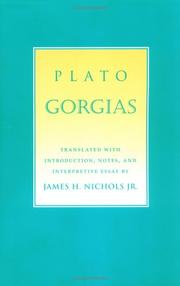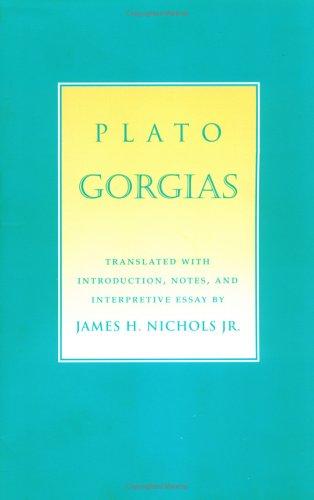Check nearby libraries
Buy this book

"James H. Nichols Jr. offers a precise yet unusually readable translation of this great Platonic dialogue on rhetoric. The Gorgias presents an intransigent argument that justice is superior to injustice - to the extent that suffering an injustice is preferable to committing an unjust act. The dialogue contains some of Plato's most significant and famous discussions of major political themes, and focuses dramatically and with unrivaled intensity on Socrates as a political thinker and actor.".
"Nichols's attention to dramatic detail brings the dialogue to life. Plato's striking variety in conversational address (names and various terms of relative warmth and coolness) is carefully reproduced, as is alteration in tone and implication even in the short responses.
A general introduction on rhetoric from the Greeks to the present shows the problematic relation of rhetoric to philosophy and politics; states the themes that unite the Gorgias with the Platonic dialogue Phaedrus, also available in a new translation by James H. Nichols Jr.; and outlines interpretive suggestions.".
"Together with the Phaedrus, the Gorgias reveals both the private and the political rhetoric emphatic in Plato's philosophy, yet often ignored in commentaries on it. Nichols believes that Plato's thought on rhetoric has been largely misunderstood, and he uses his translations of the Gorgias and the Phaedrus as an opportunity to reconstruct the classical position on right relations between thought and public activity."--BOOK JACKET.
Check nearby libraries
Buy this book

Previews available in: Finnish English French Japanese Latin Ancient Greek
Subjects
Classic Literature, Fiction, OverDrive, Accessible book, Early works to 1800, Ethics, Political science, Ancient Philosophy, great_books_of_the_western_world, open_syllabus_project, Love, Greek language materials, Political science, early works to 1800, Rhetoric, Morale, Ouvrages avant 1800, Science politique, Gorgias (Plato), Philosophy, ancient, Plato, Ethics, ancient, Rhetoric, ancient, Translations into Latin, Greek Dialogues, Textual Criticism, Greek language, Translating into Latin, Ancient Ethics, Ancient Rhetoric, Contributions in political science, Children's fiction, Ships, Shipbuilding, History, Ancient Ships, Political science--early works to 1800, B371.a5 h3 1971, 170, B371.a5 i78, Literary collections, Ethics--early works to 1800, B371.a5 n53 1998b, Philosophy, SpiritualityPeople
Plato, Platon, Thomas Hobbes (1588-1679)Showing 13 featured editions. View all 224 editions?
| Edition | Availability |
|---|---|
| 01 |
bbbb
|
| 02 |
cccc
Libraries near you:
WorldCat
|
| 03 |
cccc
Libraries near you:
WorldCat
|
| 04 |
cccc
Libraries near you:
WorldCat
|
| 05 |
cccc
Libraries near you:
WorldCat
|
| 06 |
cccc
Libraries near you:
WorldCat
|
| 07 |
bbbb
|
| 08 |
aaaa
Libraries near you:
WorldCat
|
| 09 |
cccc
|
| 10 |
bbbb
Libraries near you:
WorldCat
|
| 11 |
bbbb
Libraries near you:
WorldCat
|
| 12 |
bbbb
|
| 13 |
bbbb
Libraries near you:
WorldCat
|
Book Details
Edition Notes
Classifications
The Physical Object
ID Numbers
Work Description
There is a well-known saying that the whole of Western Philosophy is footnotes of Plato. This is because his writings have set the schema that philosophy can be said to have followed ever since. Following under the teachings of Socrates, Plato's works are among the world's greatest literature. In the Gorgias, as in nearly all the other dialogues of Plato, we are made aware that formal logic has as yet no existence. The dialogue naturally falls into three divisions, to which the three characters of Gorgias, Polus, and Callicles respectively correspond; and the form and manner change with the stages of the argument.Please Note: This book is easy to read in true text, not scanned images that can sometimes be difficult to decipher. The Microsoft eBook has a contents page linked to the chapter headings for easy navigation. The Adobe eBook has bookmarks at chapter headings and is printable up to two full copies per year.
Community Reviews (0)
Feedback?History
- Created April 1, 2008
- 12 revisions
Wikipedia citation
×CloseCopy and paste this code into your Wikipedia page. Need help?
| July 11, 2024 | Edited by MARC Bot | import existing book |
| December 19, 2023 | Edited by ImportBot | import existing book |
| September 4, 2023 | Edited by AgentSapphire | Merge works |
| August 24, 2023 | Edited by AgentSapphire | reverted to revision 5 |
| April 1, 2008 | Created by an anonymous user | Imported from Scriblio MARC record |























